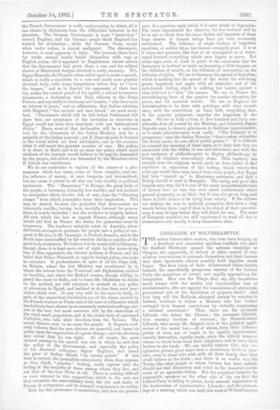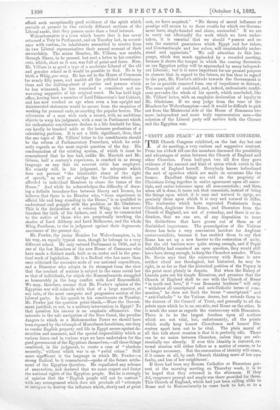LIBERALISM AT WOLVERHAMPTON.
THE minor Conservative orators, who have been keeping up a desultory and somewhat spiritless fusillade ever since Sir Stafford Nortbcote opened the autumn campaign at Glasgow, al.e, apparently, in default of other sources of con- solation, very anxious to persuade themselves and their hearers that their opponents cannot possibly hold together much longer. The keen vision of these disinterested critics detects beneath the superficially prosperous exterior of the Liberal Party, the symptoms of certain and rapidly approaching dis- integration. How can the Whigs, they say, ally themselves much longer with the motley and caucus-ridden host of revolutionaries, who are sapping the foundations of aristocratic government and of the institution of property itself ? And how long will the Radicals, alienated already by coercion in Ireland, continue to follow a Minister who has further outraged their deepest convictions by violently suppressing a national movement ? Then, there are the moderate Liberals, who detest the Closure ; the economic Liberals, who worship freedom of contract ; the Nonconformist Liberals, who ,accept Mr. Bright's view of the political appli- cation of the moral law,—all of whom, from their different points of view, are, or ought to be, equally apprehensive, equally distrustful, equally, ready, when the critical moment comes, to break loose from their allegiance, and to leave their leaders in the lurch. We can hardly suppose that this im- aginative picture gives more than a momentary thrill of plea- sure, even to those who wish with all their heal that they could believe in the truth ; and there is no reason why the Tories, like other people to whom fortune has been unkind, should not find distraction and relief in the transient excite- ment of an agreeable fiction. But the perpetual iteration by responsible speakers on the other side of the cry that the Liberal Party is falling to pieces, lends unusual importance to the declarations of representative Liberals ; and the proceed- ings at a meeting which was held this week at Wolverhampton
afford such exceptionally good evidence of the spirit which prevails at present in two entirely different sections of the Liberal ranks, that they possess more than a local interest.
Wolverhampton is a town which boasts that it has never returned a Tory to Parliament, and on Tuesday last, in accord- ance with custom, its inhabitants assembled to receive from its two Liberal representatives their annual account of their stewardship. The senior Member, Mr. Villiers, was unable, through illness, to be present, but sent a letter to his constitu- ents, which, short as it was, was full of point and force. Now, Mr. Villiers is as good a type of a moderate Liberal of the old
and genuine school as it would be possible to find. He is by birth a Whig,pur sang. He has sat in the House of Commons for nearly fifty years, and amidst all the political transforma- tions and the shifting-about of parties and persons which he has witnessed, he has remained a consistent and un- wavering supporter of his original creed. He has held high office, having been a member of Lord Palmerston's last Cabinet, and has now reached an age when even a less upright and disinterested statesman would be secure from the suspicion of working for personal ends, or courting the popular breeze. The utterances of a man with such a record, with no ambitious objects to warp his judgment, with a seat in Parliament which his enthusiastic constituents declare is a life freehold for him, can hardly be brushed aside as the insincere professions of a calculating partisan. It is not a little significant, then, that the one topic of Mr. Villiers' letter to his constituents should be the reform of Parliamentary Procedure, which he evid- ently regards as the most urgent question of the day. Hia condemnation of the existing system, of whieh it must be remembered that he has had, unlike Mr. Marriott and Mr. Gibson, half a century's experience, is couched in as strong language as any that its severest critic has employed. No remedy will, in his judgment, be adequate which does not prevent " the intolerable abuse of the right of speech,'' as well as abridge the " facilities which are afforded to individual Members to abuse the forms of the House." And while he acknowledges the difficulty of draw- ing a definite boundary-line between liberty and licence, he believes that there is no Member who, " from experience in official life and long standing in the House," is so qualified to understand and grapple with the problem as Mr. Gladstone. This is the declaration of a veteran Whig, who has never forsaken the faith of his fathers, and it may be commended to the notice of those who are perpetually invoking the shades of Lord Althorp and Lord Melbourne, and the whole Whig Pantheon, to rise in judgment against their degenerate successors of the present day.
Mr. Fowler, the junior Member for Wolverhampton, is, in his way, an equally typical man, though he belongs to a very different school. He only entered Parliament in 1880, and is one of the few Members of the new House of Commons who have made a distinct mark, both as an orator and in the prac- tical work of legislation. He is a Radical who has more than once criticised the excessive scale of our national expenditure, and a Dissenter who adopts in its strongest form the view that the conduct of nations is subject to the same moral law as that of individuals, for which the Nonconformists struggled
so honourably the long conflict with Lord Beaconsfield. We may, therefore, assume that Mr. Fowler's opinion of the Egyptian war will coincide with that of a large number, at any rate, of the most energetic and progressive section of the Liberal party. In his speech to his constituents on Tuesday, Mr. Fowler put the question point-blank,—Were the Govern- ment justified, or not, in a military intervention in Egypt ? To that question his answer is an emphatic affirmative. Our interests in the safe navigation of the Suez Canal, the peculiar dangers to which as a Mahommedan Power wo should have been exposed by the triumph of Mussulman fanaticism, our duty to render English property and life in Egypt secure against de- struction and massacre, and the special responsibility which at various times and in various ways we have undertaken for the. good government of the Egyptians themselves,—all these things combined, in his judgment, to create a case of " absolute necessity," without which war is an " awful crime." Still more signi'ficant is the language in which Mr. Fowler—a strong Radical, be it remembered—spoke of the future settle- ment of the Egyptian Question. He repudiated any scheme of annexation, and declared that we must respect and foster the national rights of the Egyptian people. But he is strongly of opinion that the " English people will not bo content " with any arrangement which does not preclude all "attempts or intrigues to destroy the influence svhich, slowly and at great cost, we have acquired." "No theory of moral influence or prestige will secure to us those results for which our Govern- ment have, single-handed and alone, contended." If we are to carry out effectually the work which we have under- taken, it is essential that we should " possess and re- tain the material guarantees which Egypt and her rulers, and Constantinople and her rulers, will unmistakably under-
stand and appreciate." We call attention to this lan- guage, which was much applauded by a crowded meeting, because it shows the temper in which the coming discussion on our Egyptian policy will be approached by many independ- ent Liberals ; but it is more important for our present purpose to observe that in regard to the future, no less than in regard to the past, Mr. Fowler's attitude towards the Government is as far as possible removed from one of impatience or distrust. The same spirit of unabated, and, indeed, enthusiastic confid- ence pervades the whole of his speech, which concluded, like Mr. Villiers' letter, with an emphatic declaration of loyalty to Mr. Gladstone. If we may judge from the tone of the Members for Wolverhampton—and it would be difficult to pick out from the Ministerial side of the House of Commons two more independent and more truly representative men—the cohesion of the Liberal party will survive both the Closure and the Egyptian war.



































 Previous page
Previous page